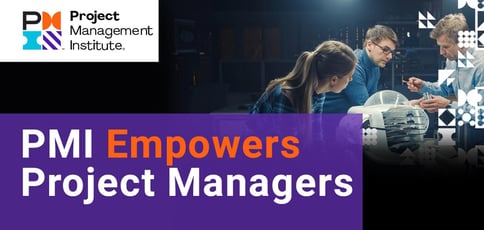
TL; DR: PMI provides project managers with the resources, community, and knowledge to grow in their careers and advance organizational success. The institute prepares its members to take on digital disruption and operate with agility through certifications and courses, such as its Citizen Developer suite of offerings that supplies employees with the skills to build applications. By highlighting the need for power skills, including empathy and collaboration, PMI empowers professionals to be changemakers and make an impact not only in the workplace but also in their communities.
As the world enters the post-pandemic era, companies who have felt the digital disruption caused by the COVID-19 pandemic have recognized the importance of technology in their operations. The global climate and economy have undergone continuous change in the last two years, and only those who learned to adapt and operate with agility were able to thrive.
By leveraging novel technologies, businesses could free up time to work on more creative processes and drive success on different fronts. It’s no secret that employees, especially project managers, will also need to be resilient to create better business outcomes in challenging environments.
“As agility and resiliency increasingly become the key measures by which organizations are assessed, there’s a substantial need for project professionals who have the necessary skills to drive change — both within organizations and for society at large,” said Dave Garrett, Chief Strategy & Growth Officer at Project Management Institute.

The Project Management Institute, also known as PMI, helps project managers establish effective work habits and learn ‘power skills’ to influence change in their organizations. Dave said power skills, including empathy and communication, are more significant than ever in a remote work environment.
PMI’s recent report, Narrowing the Talent Gap, revealed that project managers should at least have these top five capabilities: relationship building, collaborative leadership, strategic thinking, creative problem solving, and commercial awareness. Project management teams should also account for diversity.
“Teams cannot work in silos anymore, and it’s clear in today’s project management landscape that cross-functional teams drive the most project success. Embracing diversity and therefore different strengths and perspectives is crucial, allowing teams to consider all possible angles and solutions,” said Dave.
How Digital Disruption Has Altered Project Management
Digital disruption has changed how many industries operate, and it is no different for the project management sector of these industries. Innovative platforms have taken over manual processes, simplifying workloads for the human workforce and altering the workplace landscape.
“Administrative tasks that were previously performed by a human can now be automated thanks to the evolution of AI, allowing project managers to have more freedom and flexibility to exercise their creative muscles when it comes to project ideation, implementation, strategy, and follow-through,” said Dave.
Dave also said digital disruption is here to stay, and employees will have to grow accustomed to continuous change in their fields to be successful. Technology has become integral to business operations, and project managers will need to have digital fluency to leverage its benefits, which is why PMI created its Citizen Developer suite of offerings.
Its Citizen Developer suite allows project managers to attain the skills necessary to manage projects involving low-code/no-code and teaches learners how to use low-code/no-code in a safe and scalable way. The courses provide the tools and methodologies to help project managers gain the knowledge to push forward development projects, especially in companies that lack software developers. Participants can take the foundation courses for personal improvement or to train teams.
“But it’s not just about digital transformation but also perpetual transformation — this idea that you’re constantly evolving in all aspects of your business… cultivating perpetual transformation within your organization is what will separate successful businesses from unsuccessful ones,” said Dave.
Empowering People to Be Changemakers
PMI enables project managers to make better business decisions through collaboration, research, networking, advocacy, and education. The institute empowers employees to share ideas and take on ground-breaking projects regardless of their position.
“It’s this notion that instead of asking, ‘Who will get this done?’ changemakers are instead asking, ‘How can I be the one to get this done, alongside my team?’ Changemakers are active leaders in this regard, not passive bystanders,” said Dave.
With this mindset, PMI inspires project managers to come together with their communities to maximize impact. And its many resources, including its Citizen Developer suite of offerings, help its users drive that change. Dave said PMI is intentional about how it offers resources and makes sure it provides users with all they need to build expertise and skill along their journey to professional development.

PMI’s influence on the project management field has been evident. Project managers who received PMI’s PMP certification have seen a 16% increase in median salary compared with those who don’t have it, according to PMI’s 2021 Earning Power Salary Survey.
PMI helps advance thought leadership and community, encourage professional development, and strengthen organizational success worldwide by setting up project managers for success.
“Furthermore, it’s the organizations that put trust in their project leaders who benefit from citizen development, understanding that these professionals are the true changemakers within their organizations. They are proactively driving change and transformation by turning ideas into reality,” said Dave.
Highlighting the Need for Power Skills
According to PMI’s recent Talent Gap report, the global economy will need 25 million project managers by 2030. Dave said PMI prides itself on responding to the growing need of project professionals by providing them with the resources to grow in their careers and create change in their organizations. At the end of 2021, PMI launched its Construction Professional in Built Environment Projects (CPBEP)™ certification, its first industry-specific certification, to help target the needs of project managers in that field.
“Project managers will always need technical skills, of course, but there’s an increasing need to focus on what we at PMI call ‘power skills,’ such as communication and empathy, that help people connect with one another and align on a shared vision to bring projects and big ideas to life,” said Dave.
Recently, PMI has focused on meeting the demand for power skills for leaders and team members. Dave said empathy is crucial for seeing the world through the eyes of the customer or a colleague, and collaboration is even more critical now with remote work settings.
Employees should have innovative mindsets, so they can continue to evolve with the industry and meet changing growth rates. And having that outlook and skill set will only help businesses stay ahead of the competition.
Dave said PMI’s focus on power skills and meeting the needs of the project management community will continue to drive every decision it makes for both its growth strategy and the resources it offers customers.
“It’s exciting to see how we’re continuing to monitor the needs of our stakeholders and the world at large, knowing that skilled project professionals and changemakers in an array of industries are needed to carry out big, important projects. We are proud to support their professional journeys by providing the tools and resources they need to be successful in any endeavor that comes their way,” said Dave.


